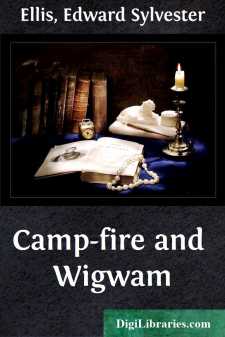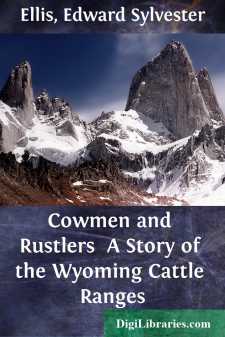Categories
- Antiques & Collectibles 13
- Architecture 36
- Art 48
- Bibles 22
- Biography & Autobiography 813
- Body, Mind & Spirit 141
- Business & Economics 28
- Children's Books 12
- Children's Fiction 9
- Computers 4
- Cooking 94
- Crafts & Hobbies 4
- Drama 346
- Education 46
- Family & Relationships 57
- Fiction 11826
- Games 19
- Gardening 17
- Health & Fitness 34
- History 1377
- House & Home 1
- Humor 147
- Juvenile Fiction 1873
- Juvenile Nonfiction 202
- Language Arts & Disciplines 88
- Law 16
- Literary Collections 686
- Literary Criticism 179
- Mathematics 13
- Medical 41
- Music 40
- Nature 179
- Non-Classifiable 1768
- Performing Arts 7
- Periodicals 1453
- Philosophy 64
- Photography 2
- Poetry 896
- Political Science 203
- Psychology 42
- Reference 154
- Religion 513
- Science 126
- Self-Help 83
- Social Science 81
- Sports & Recreation 34
- Study Aids 3
- Technology & Engineering 59
- Transportation 23
- Travel 463
- True Crime 29
Edward Sylvester Ellis
Edward Sylvester Ellis (1840-1916) was a prolific American author known for his contributions to juvenile fiction, particularly Westerns and adventure stories. Among his most famous works is "The Steam Man of the Prairies" (1868), which is considered one of the earliest science fiction novels featuring a robot-like invention. Throughout his career, Ellis wrote under various pseudonyms and produced over 400 novels, captivating young readers with tales of frontier life and adventure.
Author's Books:
Sort by:
AT NEW CONSTANTINOPLE IT had been snowing hard for twenty-four hours at Dead Man’s Gulch. Beginning with a few feathery particles, they had steadily increased in number until the biting air was filled with billions of snowflakes, which whirled and eddied in the gale that howled through the gorges and cañons of the Sierras. It was still snowing with no sign of cessation, and the blizzard blanketed...
more...
HO, FOR CALIFORNIA. One beautiful misummer night in 18— a large, heavily laden steamer was making her way swiftly up the Pacific coast, in the direction of San Francisco. She was opposite the California shore, only a day's sail distant from the City of the Golden Gate, and many of the passengers had already begun making preparations for landing, even though a whole night and the better part of a...
more...
CAPTAIN STRATHMORE’S PASSENGER A few hours before the sailing of the steamer Polynesia, from San Francisco to Japan, and while Captain Strathmore stood on deck watching the bustle and hurry, he was approached by a nervous, well-dressed gentleman, who was leading a little girl by the hand. “I wish you to take a passenger to Tokio for me, Captain Strathmore,” said the stranger. The honest, bluff...
more...
Chapter I. On a certain summer day, a few years ago, the little village of Briggsville, in Pennsylvania, was thrown into a state of excitement, the like of which was never known since the fearful night, a hundred years before, when a band of red men descended like a cyclone upon the little hamlet with its block-house, and left barely a dozen settlers alive to tell the story of the visitation to their...
more...
CHAPTER I. AT HOME. On the evening of a dismal, rainy day in spring, a mother and her son were sitting in their log-cabin home in the southern portion of the present State of Missouri. The settlement bore the name of Martinsville, in honor of the leader of the little party of pioneers who had left Kentucky some months before, and, crossing the Mississippi, located in that portion of the vast territory...
more...
CHAPTER I. A MERRY GROUP. The Whitney household, in the western part of Maine, was filled with sunshine, merriment and delight, on a certain winter evening a few years ago. There was the quiet, thoughtful mother, now past her prime, but with many traces of the beauty and refinement that made her the belle of the little country town until Hugh Whitney, the strong-bearded soldier, who had entered the war...
more...
INTRODUCTION I purpose telling you in the following pages about the exploits of the gallant men who composed the American Navy, beginning with the Revolution and ending with the story of their wonderful deeds in our late war with Spain. You can never read a more interesting story, nor one that will make you feel prouder of your birthright. While our patriot armies have done nobly, it is none the less...
more...
CHAPTER I. RETROSPECTIVE. Those of my friends who have done me the honor of reading "Campfire and Wigwam," will need little help to recall the situation at the close of that narrative. The German lad Otto Relstaub, having lost his horse, while on the way from Kentucky to the territory of Louisiana (their destination being a part of the present State of Missouri), he and his young friend, Jack...
more...
CHAPTER I. A WARNING In the valley of the Rio Pecos, years ago, an attempt at founding a settlement was made by a number of hardy and daring New Englanders, whose leader was a sort of Don Quixote, who traveled hundreds of miles, passing by the richest land, the most balmy climate, where all were protected by the strong arm of law, for the sake of locating where the soil was only moderate, the climate...
more...
THE GOLD-HUNTERS. Jeff Graham was an Argonaut who crossed the plains in 1849, while he was yet in his teens, and settling in California, made it his permanent home. When he left Independence, Mo., with the train, his parents and one sister were his companions, but all of them were buried on the prairie, and their loss robbed him of the desire ever to return to the East. Hostile Indians, storm, cold,...
more...




![Adrift on the Pacific
A Boys [sic] Story of the Sea and its Perils](https://digilibraries-com.s3.eu-central-1.amazonaws.com/covers/5b1ab9f1-643e-492e-89a5-0a940f25d89d.jpg)






